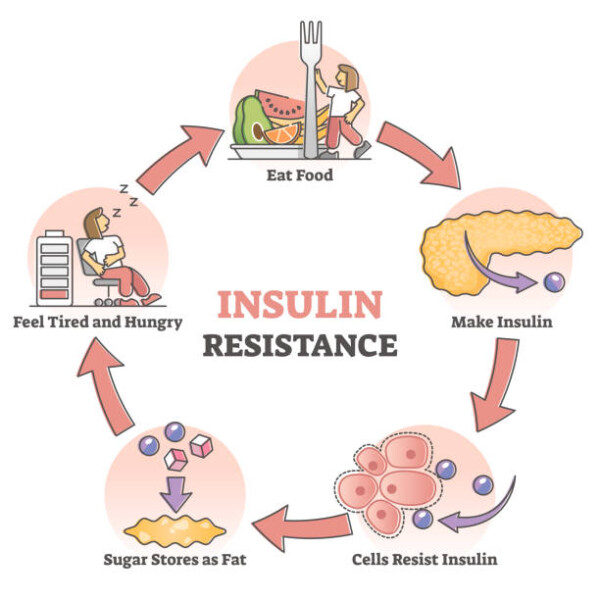
Insulin resistance occurs when the cells in your body become less responsive to the hormone insulin, which helps regulate blood sugar levels. This condition can lead to various health issues over time. Here’s an overview of insulin resistance and its potential side effects:
What is Insulin Resistance?
- Insulin is a hormone produced by the pancreas that allows cells to absorb glucose from the bloodstream for energy or storage.
- In insulin resistance, the body’s cells don’t respond effectively to insulin, leading the pancreas to produce more insulin to compensate.
- Over time, this can result in high insulin levels (hyperinsulinemia) and eventually high blood sugar levels (hyperglycemia), paving the way for prediabetes or type 2 diabetes.
Causes of Insulin Resistance
- Genetics: A family history of diabetes can increase risk.
- Obesity: Excess fat, especially around the abdomen, can contribute to resistance.
- Physical Inactivity: Lack of exercise reduces glucose uptake by muscles.
- Poor Diet: Diets high in refined carbs, sugars, and unhealthy fats can worsen insulin resistance.
- Hormonal Changes: Polycystic ovary syndrome (PCOS) and metabolic syndrome are linked to insulin resistance.
- Chronic Stress and Poor Sleep: These can affect cortisol levels, increasing the risk of insulin resistance.
Side Effects and Complications of Insulin Resistance
Insulin resistance itself doesn’t always cause symptoms, but over time, it can lead to serious health problems:
1. Metabolic Effects
- Weight Gain: Particularly around the abdomen.
- Difficulty Losing Weight: Insulin resistance can make fat storage more efficient, making weight loss harder.
- Fatigue: Reduced glucose uptake by cells leads to lower energy levels.
2. Prediabetes and Type 2 Diabetes
- High Blood Sugar: Persistent insulin resistance can cause elevated blood glucose levels.
- Diabetes Symptoms: Increased thirst, frequent urination, and slow wound healing.
3. Cardiovascular Issues
- High Blood Pressure: Insulin resistance is linked to hypertension.
- Dyslipidemia: Abnormal cholesterol levels, such as high triglycerides and low HDL (good cholesterol).
- Atherosclerosis: Increased risk of plaque buildup in arteries, leading to heart disease or stroke.
4. Non-Alcoholic Fatty Liver Disease (NAFLD)
- Excess insulin and glucose in the bloodstream can lead to fat accumulation in the liver, increasing the risk of inflammation and liver damage.
5. Polycystic Ovary Syndrome (PCOS)
- In women, insulin resistance is a key factor in PCOS, which can cause irregular menstrual cycles, infertility, and increased facial hair.
6. Increased Risk of Cancer
- Chronic high insulin levels are linked to an increased risk of certain cancers, such as breast and colorectal cancer.
7. Skin Changes
- Acanthosis Nigricans: Dark, velvety patches of skin, often on the neck, armpits, or groin.
- Skin Tags: Small, benign growths on the skin.
8. Chronic Inflammation
- Insulin resistance can promote systemic inflammation, contributing to various health issues, including joint pain and autoimmune conditions.
Managing and Reversing Insulin Resistance
The good news is that insulin resistance can often be managed or even reversed with lifestyle changes:
- Dietary Changes:
- Choose low-glycemic, whole foods like vegetables, whole grains, lean proteins, and healthy fats.
- Limit refined carbs, added sugars, and processed foods.
- Exercise Regularly:
- Both aerobic exercise (e.g., walking, swimming) and resistance training improve insulin sensitivity.
- Weight Loss:
- Losing even 5–10% of body weight can significantly improve insulin sensitivity.
- Stress Management:
- Practice relaxation techniques like meditation, yoga, or deep breathing.
- Quality Sleep:
- Aim for 7–9 hours of sleep per night to regulate hormones and reduce stress.
- Medication (if needed):
- Metformin: Often prescribed for managing insulin resistance and prediabetes.
- Consult with a healthcare provider for personalized medical advice.
Conclusion
If left unmanaged, insulin resistance can lead to serious complications like type 2 diabetes, heart disease, and liver damage. However, with proactive lifestyle changes, it is often reversible. Early detection and intervention are key to maintaining long-term health. If you suspect insulin resistance, consult a healthcare professional for testing and guidance.


